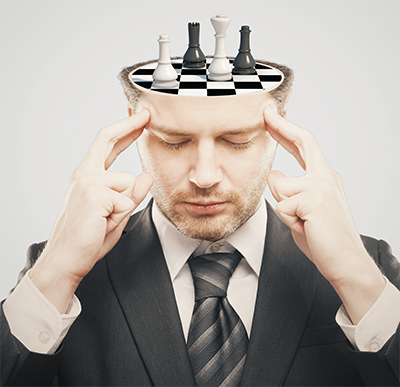Those of you chess players who have sat through an entire game, however amateurish it was, would know the sequence of emotions that arise within you at every change in the game. Though the ancient board game could give off a “monk-in-meditation” vibe for the less enlightened mortals, it sure affects your adrenalin as any other sport does.
Ace players must be familiar with the string of emotions that occur during serious games. The tingling hope of a right move, the secret joy of confusing one’s opponent, the despair at calculations went wrong, the frustration and anger at feeling trapped; you name it and you get it! Chess players experience every emotion possible in a sport. Perhaps even more pressure and stress than others do.
Beyond a Board of Game: Chess and its emotional attributes
Today’s professional players are conscious of the larger social canvas of the game and are adept at keeping their cool and the sportsman spirit. But the long history of Chess has quite a few hilarious as well as hair-raising incidents of emotional outbursts by the early exponents of the game.
How a scuffle over chess between England’s King Henry I and France’s Louis VI, in 1120 triggered the 12-year war between both nations, would explain the gravity of volcanic emotions in a game of chess!
But did you know chess, by itself, is an effective tool in psychotherapy? According to Dr. Angelo Subida, Clinical Psychotherapist, speaker, and author of the book “Chess and Life”, Chess therapy is used as a creative and alternative diagnostic technique for issues concerning neurobehavioral and mental disorders.
The therapeutic power of chess was discovered early in AD 852-932 by a Persian polymath named Rhazes, who was chief physician at Baghdad Hospital. Rhazes is said to have used chess to help his patients relate to real-life problems and help them think clearer through the game’s strategies and tactics.
Dr. Subida quotes from Wikipedia on chess therapy, "One of the earliest reported cases of chess therapy involves the improvement in an isolated, schizoid, 16-year old youth that took place after he became interested in chess” For him Chess became an outlet to vent his bottled up hostilities in a tactful, “non-retaliatory” way.
The boy eventually became more expressive about his feelings as he was able to relate to the emotional situations of the game that aligned with his mental dilemmas, dreams or fantasies.
This report demonstrates the surreal nature of chess that helped the patient to gain conscious control over his emotions and master them to some extent.
Chess as a Therapy: Setting the minds straight
Over the past decades chess therapy has proved to be highly effective for those with neurobehavioral disorders, especially children with ADHD, bipolar disorders, depression etc.
Dr. Subida, a multidisciplinary therapist whose specialization includes parent-child therapy, anger management, depression, and addictions, focuses on innovative chess therapy. He finds it helpful for patients in building a more relaxed and friendly bonding with their therapists and vent their emotions indirectly and effectively.
As the game demands active participation from both the client and the therapist, the mood changes to a more creative and recreational game rather than a deliberate therapy session.
According to Subida, Manny Pacquaio, the world boxing champion from the Philippines uses chess as a therapeutic balance in his sport and life. Pacquaio, who is an ace player in chess as well, plays chess for mental conditioning before his crucial boxing championships.
In therapy, Chess games are considered to aptly channelize the innermost thoughts, emotions, and actions and make up for one's shortcomings in life. Every move, strategy or tactic, in a game of chess could represent one’s personal or emotional conflict and could contain the rejected or discarded pieces of the self.
Rewinding the Broken Cords:Role of Chess in Psychoanalysis
In psychoanalysis, chess games play the role of wish-fulfilment. Fulfilment of one’s repressed desires – desires that scare the life out of you that your games turn disastrous!
The game also enables the player to view, let out or to relive his/her aggressive impulses, or the suppressed desire to win over failed circumstances. For instance, if you are angry over someone, you could gain emotional satisfaction from a victorious move against your opponent. A feeling of failure – academic, professional or personal - or the frustration over uncontrollable circumstances (divorce of parents, loss of a loved one) can be well-articulated through an intense game of chess.
According to psychotherapists, Chess games could help in revealing the conditions and the reasons behind a person’s psychological problems —the various dimensions and angles – and also point to a solution for the disorder.
Chess games ‘contain well-being in the fullest sense’ - helping to unleash the potentialities of an individual through the analytical nature of the game.
For younger children, the benefits of learning or playing chess have been proven in developing or strengthening skills such as:
Focus: Careful observation and concentration
Visualization: Imagining a sequence of actions before its implementation
Foresightedness: Aware of or think about the consequences before an action
Analytical observation: Finding the pros and cons of various actions
Analytical reasoning: Logical v/s impulsive decision making
Abstract Thinking: Consider the bigger picture
Planning: Develop long term goals and bring them about
Ability to handle multiple considerations simultaneously: Weighing various factors at a time.
If you are keen about ‘rearranging’ your child’s perspectives, attitudes or emotional responses, intending to make him or her a more mature individual capable of handling situations and dilemmas effectively, then introduce him/her to Chess! At Mind Mentorz, we do not merely teach chess, but we mentor young minds with positive attitudes and traits that strengthen them as sensible, focused individuals capable of conquering their dreams. To know more on the power of Chess in mentoring minds, visit us at www.mindmentorz.com or call us at +91 6366448646


